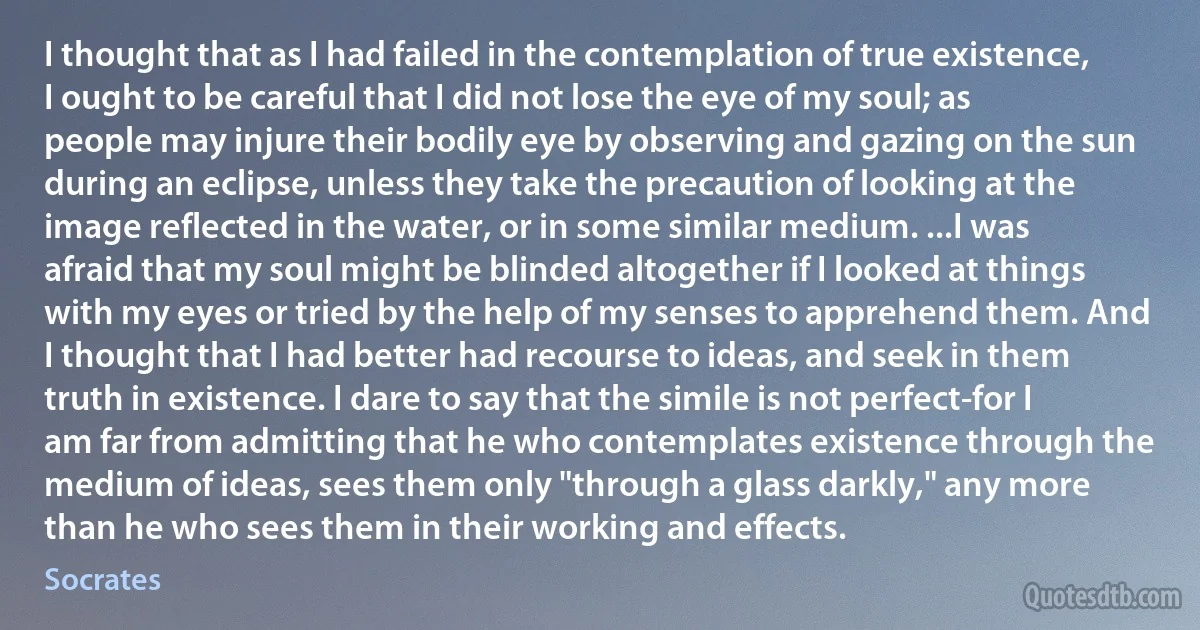
I thought that as I had failed in the contemplation of true existence, I ought to be careful that I did not lose the eye of my soul; as people may injure their bodily eye by observing and gazing on the sun during an eclipse, unless they take the precaution of looking at the image reflected in the water, or in some similar medium. ...I was afraid that my soul might be blinded altogether if I looked at things with my eyes or tried by the help of my senses to apprehend them. And I thought that I had better had recourse to ideas, and seek in them truth in existence. I dare to say that the simile is not perfect-for I am far from admitting that he who contemplates existence through the medium of ideas, sees them only "through a glass darkly," any more than he who sees them in their working and effects.
SocratesRelated topics
contemplation dare eye far glass help looking lose might ought people recourse say seek simile soul sun take thought truth try water working things eyesRelated quotes
For what advantage is it, that the world enjoys profound peace, if thou art at war with thyself? This then is the peace we should keep. If we have it, nothing from without will be able to harm us. And to this end the public peace contributes no little: whence it is said, ‘That we may lead a quiet and peaceable life.' But if any one is disturbed when there is quiet, he is a miserable creature. Seest thou that He speaks of this peace which I call the third (inner, ed.) kind? Therefore when he has said, ‘that we may lead a quiet and peaceable life,' he does not stop there, but adds ‘in all godliness and honesty.' But we cannot live in godliness and honesty, unless that peace be established. For when curious reasonings disturb our faith, what peace is there? or when spirits of uncleanness, what peace is there?

John Chrysostom
Don't forget that God sees you and watches you when you are in pain; He perceives even the beating of your heart. Consequently, He will not leave you without consolation and His fatherly protection. Naturally, the saints rejoiced in their afflictions; as for us, let us at least manage to accept affliction or pain patiently.
My child, pray within your heart, and the name of Jesus will become for you a comforting balm so that you can bear this trial of yours in a way which benefits you. You will greatly benefit from this trial if you submit yourself to it patiently. So again I say to you, with the almighty armor of prayer continually approach the omnipotent Lord more often, and you will come to know how He wondrously lifts the burden of pain and marvellously gives rest to sufferers.

Ephraim of Arizona
If Christ were to walk in this world today, do you know what would happen to Him? He would be placed in a mental institution and given psycho-therapy, just as would His Saints. The world would crucify Him today just as it did 2000 years ago, for the world has not learned a thing, except more devious forms of hypocrisy. And what would happen if, in one of my classes at the university, I would one day tell my students that all the learning of this world is of no importance beside the duty of worshipping God, accepting the God-man who died for our sins, and preparing for the life of the world to come? They would probably laugh at me, and the university officials, if they found out, would fire me-for it is against the law to preach the Truth in our universities. We say that we live in a Christian society, but we do not: we live in a society.

Seraphim Rose
Among all the luminaries shining in the sky, the sun is the chief, and in the Brahma-samhita the sun is accepted as the glowing eye of the Supreme Lord. There are fifty varieties of wind blowing in space, and of these winds the controlling deity, Marici, represents Krishna. Among the stars, the Moon is the most prominent at night, and thus the Moon represents Krishna. It appears from this verse that the Moon is one of the stars; therefore the stars that twinkle in the sky also reflect the light of the sun. The theory that there are many suns within the universe is not accepted by Vedic literature. The sun is one, and as by the reflection of the sun the Moon illuminates, so also do the stars. Since Bhagavad-gita indicates herein that the Moon is one of the stars, the twinkling stars are not suns but are similar to the Moon.

A. C. Bhaktivedanta Swami Prabhupada
The undulation of these infinite numbers of mountains, whose snowy summits make them look as if covered by foam, recalled to my remembrance the surface of a storm-beaten ocean. If I looked towards the west, the ocean lay before me in all its majestic grandeur, a continuation as it were, of these fleecy hilltops. Where the earth ended and the sea began it was impossible for the eye to distinguish.I soon felt that strange and mysterious sensation which is awakened in the mind when looking down from lofty hilltops, and now I was able to do so without any feeling of nervousness, having fortunately hardened myself to that kind of sublime contemplation. I wholly forgot who I was, and where I was. I became intoxicated with a sense of lofty sublimity, without thought of the abysses into which my daring was soon about to plunge me.

Jules Verne
